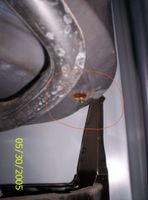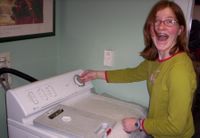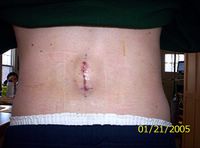rosehillworks wrote:
I am thinking about buying a new washer and dryer instead of repairing my kenmore frontloader set. Is there a brand worth buying that will last awhile before dying. I am a family of six and really need a dependable washer and dryer set.
Thanks,
Helen
(Posted in the Appliantology Group repair forum)
A good question and one I get asked a lot during service calls. It’s also hard to find unbiased information on this topic. Like Terry said, forget about Consumer Reports— they are either a scam organization or just plain stupid, I haven’t figured out which. Here, I’ll talk about the cheap top loaders that everyone likes to buy; in a subsequent post, I’ll talk about two of the best washers on the market today: the Staber and the Whirlpool Duet.
First off, you have to accept that the days of getting ~15 trouble-free years of service from a new appliance are long gone. On average, expect to do repairs every two to four years, no matter which brand you buy. What varies among the brands is the frequency and expense of the repairs. And, no, it’s not an evil plot by the manufacturers. Think about it: you can buy a new washer, dryer, refrigerator, whatever, for about the same number of dollars that you would have paid 15 years ago. Meanwhile, during that period, inflation has increased (so the dollar buys less), manufacturer’s costs have increased (materials, labor, insurance, worker’s comp., etc.), yet, magically, you can still buy that appliance for the same number of Federal Reserve Notes! How is this possible?
Because it’s not the same quality appliance that you would have purchased 15 years ago. “Aha! So they deliberately build them flimsier so they’ll fail more!” Nah, nothing nearly so exotic. The real story is a mundane matter of the manufacturers having to build appliances that people will buy, that people can afford to buy. If you had the opportunity to buy an appliance of the same quality and workmanship that you could have gotten 15 years ago with today’s dollars, you’d pay at least four to five times as much for that appliance.
Ok then. So the good news is that you can buy a new appliance for the same number of Federal Reserve Notes as it would have cost you 15 years ago. The bad news is that there’s a hidden cost of ownership in that you’ll be doing repairs every two to four years. But then, that’s why God gave us Fixitnow.com and the Appliantology Group!
Now, on to brands. In general, Whirlpool brands seem to provide the best overall value, meaning the best optimization of price and reliability. This is not to say they’re trouble-free, no-siree-Bob, not by a long-shot. You’ll still be doing repairs on ’em about every two to four years. But, in general, the repairs will be comparatively minor. For example, after three years, you may need to replace the drive coupler or the lid switch on a Whirlpool direct-drive top-loading washer– both of these are simple repairs that rate at most two mugs on the SUDS-o-meter. On the other hand, in the same three year period, you could be replacing the transmission or some other major drive component in a Maytag or GE top-loading washer. Even if such a repair is covered by warranty, you have to deal with the whole fuss of getting warranty service which, in some areas, could take weeks.
I’ve also found that, as a company, Whirlpool is very easy to deal with. They tend to go the extra mile to take care of the customer. They make warranty parts procurement easy, even for the consumer. And they make technical information readily available, a particularly enlightened paradigm when other manufacturers seem to go out of their way to make it difficult for independent servicers to obtain technical service information on their products. GE is especially bad in this regard. Speaking of GE…
Avoid GE appliances and all GE brands. They charge a premium for their products yet their repair frequency is as much or more than other brands. And the repair will cost you more because GE parts can cost two to three times more than comparable parts for other brands; it’s not like they’re better parts, either– GE just charges more for ’em. Why? ‘Cuz they can. Appliance techs often joke that GE stands for Greedy Electric. But, sadly, the real joke is on the schlumps who buy GE appliances.
Another sad joke is Maytag. This once-venerable maker of the standard-bearer of appliance reliability has taken a page from the GE playbook: make cheap junk and sell the hell out of ’em. The recent class-action settlement for the Neptune washer is one visible example. The only Maytag-brand appliances that I like anymore are the Maytag-branded dryer and the Maytag- or Magic Chef-branded gas ranges. Avoid the highly over-rated Jenn-Air brand– it’s just overpriced junk.
Frigidaire (often pronounced Frigg-i-daire by technicians working on their equipment) makes about the same quality product it always has: mediocre. If someone held a gun to my head and made me pick from either GE, Maytag, or Friggidaire, I suppose I’d choke down my bile and take the Friggidaire. The worst part about the Friggidaire is working on them. Friggs require a high degree of manual dexterity for some repairs, especially on their washing machines. These machines seem like they were designed to be worked on by extra-terrestrial technicians who have a third arm sprouting out of their chest. And from the customer’s standpoint, Frigidaire is a real pain in the pooper to deal with– unlike Whirlpool, they won’t send out needed warranty parts directly to a consumer to make their own arrangements for the repair.
Then lots of people ask, “Ok, well, what about Kenmore? Is that a good brand?” Well, who makes Kenmore? If you bothered to click that link, you’d have seen that everyone makes Kenmore… except Kenmore. Y’see, the only thing Kenmore makes is money. There ain’t no Kenmore factory in Malaysia or anywhere else. In the old days, all Kenmore appliances were made by Whirlpool exclusively. But not so any longer. So, if you buy a Kenmore, you don’t really know what you’re getting. The other problem with Kenmore is that you’re stuck dealing with Sears to resolve warranty issues since Kenmore takes over the product warranty from the manufacturer. Running a do-it-yourself appliance repair website, I hear all kinda sordid stories about people getting ripped-off or jerked-around. This one about a Kenmore refrigerator in Florida has got to be one of the all-time classics.
Recommended Reading:







